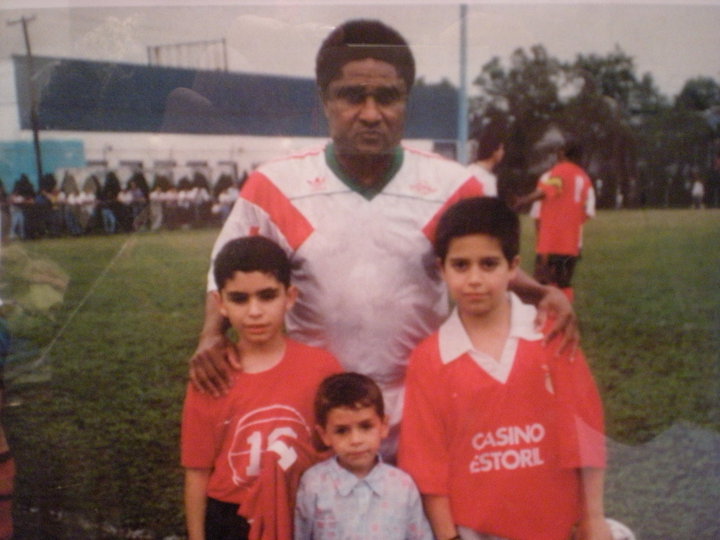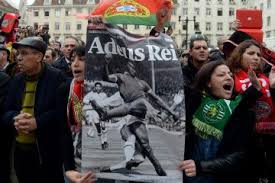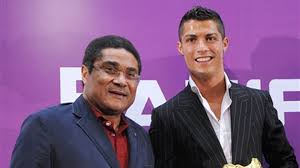|
I was stunned by the outpouring of love for Eusebio when I wrote his obituary for the Times on January 6. There were 64 comments before the NYT closed the dialogue, almost uniformly knowledgeable and reverential.
What was the attraction of the Portuguese star from Africa that made him a folk hero, more than 47 years after his marvelous World Cup? Why do soccer stars touch this nerve? I know soccer has its share of louts, and goodness knows, American sport has its A-Rods plus football stars making jackasses of themselves in public. Beyond that is the love – there is no other word – for some soccer players of the past, who showed humanity and talent. Part of the appeal is the relative modest size of soccer players, then and now. Another part is the relative nakedness – men in shorts and jerseys, out there alone in the world. And the third part is the creativity, making something from nothing, on a field, un-manipulated by that American authority figure known as Coach. I was touched by two emails I received from a lawyer in Miami, Peter Cunha, age 28, whom I have known for several years. I have his permission to use excerpts: (By Peter Cunha) “I was asleep last Sunday morning when my phone started ringing. It was my Dad, and I knew that something was wrong based on the timing of the call. He delivered the news through tears that Eusebio had passed away the night before. I was crushed. Not just because a legend had died, but also because my father’s childhood hero was gone. “My father grew up the youngest of seven kids during the ‘50s and ‘60s in Salazar’s Portugal. His father was a farmer, and though they were happy as a family and respected in the community, they were really, really, poor, and they experienced a level of poverty that I doubt my mind will ever truly comprehend. As a child my father went Christmases without presents, and grew up in a house without running water. He recently told me this past summer, when we visited his hometown on vacation, that as a kid he never thought he would own a car or a house in his lifetime. The fact that he was able to overcome this poverty and become a successful and good person is only one of the reasons he’s the greatest man I’ve ever known. “In these conditions of his youth, the brightest spot was soccer, and, more specifically, the 1966 World Cup. My father was eleven years old when it occurred, and to this day when he recounts his memories from that tournament his eyes illuminate like no other. “In the U.S., every kid has heroes they draw from sports. The average fifth grader today probably goes from being Albert Pujols to Lebron James to Peyton Manning on a single Sunday afternoon when they’re playing in the local park. But to poor kids in Portugal in 1966, Eusebio wasn’t just a star, he was the sun: the brightest object visible to man and the center of the Portuguese universe. “My Dad can still recite the starting lineup that Portugal fielded for that tournament, but more importantly, the personal memories he recalls spent watching and experiencing that tournament illustrate why sports is so important to society and why it’s more than just a game. The first time my father ever saw any instance of soccer on television was the Brazil-Portugal match that took place during that World Cup. It wasn’t his TV: a local priest had somehow obtained one for the match and relocated it to the local parish. For the equivalent of a nickel donation for admission, my father saw Pele, Eusebio, and televised soccer for the first time in the same 90 minutes. “During the North Korea game, when Portugal went down, 3-0, my Dad left the house in tears to give some hay to the animals on the farm and get a jump start on the next day’s chores, convinced that Portugal were finished. When he had come back, my uncle told him that, led by the now legendary performance of Eusebio, Portugal had fought back and won. My Dad also remembered the England game when Portugal was eliminated, and how hard he cried when the final whistle blew. “I’m pretty sure last Sunday, when my father called to tell me the news, were the first soccer-related tears he cried since 1966, including the heartbreaking loss we had to Greece in 2004 (he expressed more frustration than sadness in the latter). Later that day, I called him to see if he was coping. He was a bit better, but he was still upset, and he was holding back tears. He told me words I’ll never forget: “Taking away my parents, it was the only thing we had growing up. We were poor. We had no money for gifts or sweets. But we had Eusebio.’” Cunha added: “Sports are a lot of different things to a lot of people. Some good, some bad. But for some people, it’s the only thing, and not in a Vince Lombardi or Bill Shankly way. I mean, quite literally, sport is the only thing that brings them joy in their lives. And that’s a powerful thing, which is why we’re sad to see it go when it’s gone. “Though I was born in 1985, I was lucky enough to see Eusebio play twice in charity matches in Newark in the early ‘90s. I’m attaching a picture I took with him when I was no more than eight years old. I’m the one on the far left with Eusebio’s right hand on my shoulder, the same hand he used to pull the ball out of the net twice in that North Korea game.” Eusebio famously rushed into the net to retrieve the ball while turning a 3-0 deficit into a 5-3 victory. People still talk about that game, and Eusebio, 47 years later. I think Cunha nails the connection between the people and the people's sport. The World Cup is coming around again in June. The obituary and the comments: http://www.nytimes.com/2014/01/06/sports/soccer/portuguese-soccer-great-eusebio-is-dead-at-71.html?_r=0
James
1/22/2014 06:28:37 am
Beautifully true 1/22/2014 07:55:10 am
Every American who asks, ”why is the rest of the world so soccer crazy?” , should read Peter Cunha’s moving comments; it says it all.
George Vecsey
1/22/2014 09:11:43 am
Soccer has plenty of bad actors -- Anelka with his anti-Semitic salute, John Terry with his rap sheet of ugliness, Maradona being Maradona.
Thor A. Larsen
1/22/2014 09:53:12 am
If we are saluting soccer players, I would like to mention Pele, whom we all know. I was fortunate to see him play as a teenager with Santos of Brazil in the late 1950's at Randalls Island. He was simply spectacular scorer and player back then. He had a phenomenal soccer career, and also did valued work for the poor of Brazil and I believe he remains an active, highly respected spokesperson for Brazilian soccer. (In addition, he helped give credibility to the NY Cosmos, coming out of retirement to give some 'life' to emerging professional soccer in the US.) I am sure there are many older Brazilians who have the passion of Peter Cunha's dad for Pele.
George Vecsey
1/22/2014 11:46:03 am
Thor, he represents Brazil and soccer, but had a disagreement with Havelange and Teixeira, the two leaders of Brazilian soccer, who banned him from the 1993 draw television show in Las Vegas. Can you imagine?
Thor A. Larsen
1/22/2014 12:13:58 pm
Thank you, George! I am sure there are many more stories of human interest and soccer in your forthcoming book, "Eight World Cups"!!
George Vecsey
1/22/2014 02:22:06 pm
Modesty forbids...GV 1/23/2014 07:08:15 am
Thor
Thor A. Larsen
1/26/2014 12:27:29 pm
Alan,
John McDermott
1/28/2014 05:05:18 am
Wow. I am stunned by Mr. Cunha's moving tale of what Eusebio meant to his father, and by extension, to all of Portugal. There are many other stories like this in the Beautiful Game. I am reminded especially of hearing such stories as a kid from refugees from Hungary, Poland and Czechoslavakia where even if they had nothing, they still had Puskas, Lubanski and Masopust. Thanks Peter and George.
George Vecsey
1/29/2014 12:16:07 am
John, you are right. I am hoping to meet the Cunhas in the Ironbound of Newark during the WC this summer. Comments are closed.
|
Categories
All
|












